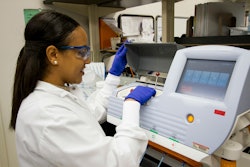After a summer visit to the Brookhaven National Laboratory in Long Island, N.Y., Shawn Mitchell couldn’t wait to plan a future career in technology.
“There were so many inspirational speakers there … they talked about not just the aspect of technology and science but about life and life’s struggles,” says Mitchell, 20, a sophomore at the New York City College of Technology, a branch of the City University of New York (CUNY) also known as City Tech. “It was just very inspiring, very eye-opening (and) I saw and experienced stuff that I never experienced before.”
Laboratory visits are one of many methods used by City Tech’s Black Male Initiative (BMI) program that engages Black male students in the STEM disciplines of science, technology, engineering and mathematics. The BMI program, which targets both potential and existing City Tech students, was recently named one of nine U.S. Model Replication Institutions by NASA and the National Science Foundation for its innovative approaches in attacking the problem of Black male student enrollment and retention.
Dr. Reginald Blake, an assistant professor of physics and BMI project director, says the program’s structure of academic advising, tutoring, summer research internships and mentoring helps keep students actively involved in the STEM fields.
BMI program officials work jointly with City Tech’s recruitment office to identify local high school students who are interested in the STEM disciplines. Through a program called College Now, these students are invited to attend classes and special City Tech campus events.
The mentorship, advising, tutoring and research components of the BMI program focus on the retention of City Tech’s existing students.
“We try to change gatekeeper courses into gateway courses … particularly math courses that our students struggle with because often times these courses force our students to change majors,” says Blake, adding that scheduled trips to various science and technology hubs help students recognize the link between college and the workforce. “We are trying to increase their access and their success in the STEM disciplines, and we need to tackle the problem from different avenues and different areas.”
Blake emphasizes that while the BMI program targets Black male students, it is open to students of both genders and all racial backgrounds. There are currently 50 City Tech students who are enrolled in the BMI program, Blake says, adding that throughout the year, BMI students participate in various hands-on research projects under faculty leadership. Mentorship, Blake says, is one of the strongest components of the BMI program.
“Many times, our students don’t even know their own potential … that’s why mentorship is so critical. Students need someone to go to and someone they can count on … many of our students just don’t have that,” Blake says. “They need someone who can help them navigate that academic pathway, and that extra nurturing is so vital.”
Jhonatan Echavarria, 22, a junior at City Tech, says close mentoring has helped him gain the confidence to apply to graduate school.
“I also tutor at the college and so I’ve been working with students, and I try to help them with their skills in mathematics and technology. That has helped me understand the material more,” says Echavarria, who is majoring in computer engineering and technology. “I get to really help other students, and other students can benefit from this program because they will get to know the kind of resources that are out there.”
The BMI program, which is funded by the New York City Council, is administered at 20 of CUNY’s campuses, Blake says. City Tech, however, is the only CUNY campus that has specifically tailored its program to the STEM fields. Blake adds that the BMI program officially launched in 2005 after officials examined the plight of young Black male students at CUNY and across the nation.
“The statistics are clear that our young Black men are doing worse than everybody else,” says Blake. “We are failing to produce the next generation of Black scientists and engineers. Something is fundamentally wrong, and we need to find innovative ways to turn the tide.”
Michele Forsten, a spokeswoman for City Tech, says the college recently hired a program evaluator who will conduct research on the retention and success of BMI students. College officials expect to have more information by the end of the current academic year.
“What we can tell you, as far as retention goes, is that 28 of the original 30 BMI students are still enrolled at the college. As far as we know, they are doing well academically,” Forsten said. “We now have 50 students, and we expect to see a similar retention pattern.”
Sonja Jackson, City Tech’s dean of curriculum and instruction, adds that the BMI program is currently in its third year of administration. College officials, she notes, are consistently examining new approaches to link the program’s methodology of teaching with research.
“This program fits completely into some of the major goals of this college and it also is linking with other grant initiatives that are focusing on this so-called STEM initiative,” Jackson says. “So it’s not just a program that’s an appendage to the college; it’s really taking on an institutional focus.”
There are currently 0 comments on this story.
Click here to post a comment
© Copyright 2005 by DiverseEducation.com


















